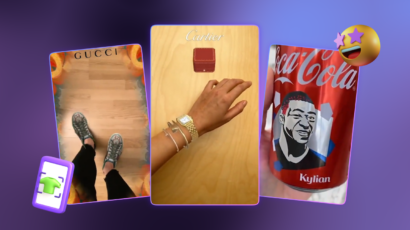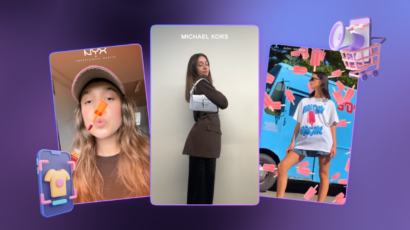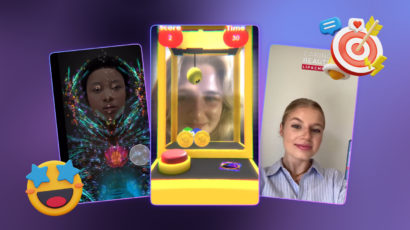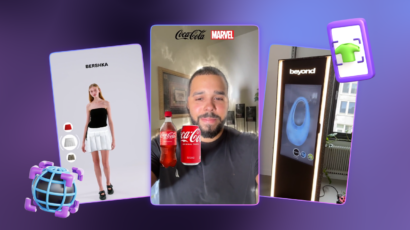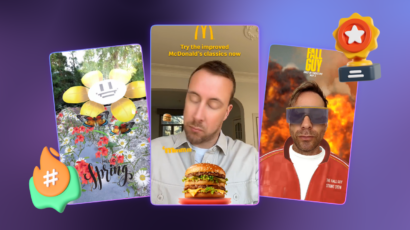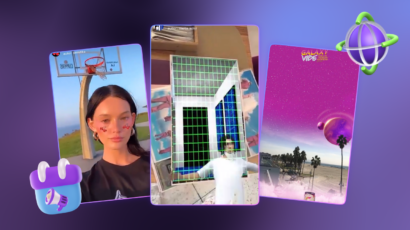Augmented Reality is a new reality. It’s reshaping the way businesses operate and interact with their customers. This technology seamlessly integrates digital 3D models into the real world, allowing users to see and interact with them as if they were part of their actual environment. This unique capability is transforms marketing strategies and operational processes, offering unparalleled advantages. Let’s examine seven innovative applications of AR that marketing managers can use to improve their business performance.
- Boosting Brand Awareness
One of the most prominent applications of AR is in raising brand awareness. AR allows businesses to craft promotional campaigns that stand out through innovative storytelling. These immersive experiences create deep emotional connections with the audience, leading to enhanced brand recall. Research indicates that AR content offers a 70% better memory recall compared to non-AR content. This makes AR an indispensable tool for marketing managers aiming to make a lasting impression.
Coca-Cola’s AR experience lets users see animations on a Coke can
Who will be one of the AR pioneers, if not everyone’s favorite brand? Coca-Cola’s AR campaign, “Coke Magic,” enabled users to scan a Coke can with their smartphones and see interactive animations. This playful and engaging experience not only boosted user interaction but also enhanced brand recall and loyalty.
- Interactive Product Packaging
AR is transforming product packaging by overcoming traditional limitations such as space constraints and engagement levels. AR packaging can share extensive information creatively, using visuals, audio, and animations, making the product exploration process more engaging for consumers.
Jack Daniel’s AR packaging takes users on a virtual distillery tour
Jack Daniel’s used AR to take consumers on a virtual tour of its distillery. By scanning the packaging, users could learn about the whiskey-making process and the brand’s history, resulting in high engagement and a memorable customer experience.
- Virtual Try-Ons
AR allows customers to try on products virtually, from clothing and accessories to cosmetics and footwear. This not only enhances the shopping experience by helping customers make informed decisions but also reduces product returns.
Gucci’s AR app allows users to virtually try on sneakers.
Gucci’s app features an AR try-on function for sneakers, letting users see how the footwear would look on their feet. This interactive experience leads to quicker purchasing decisions and higher customer satisfaction.
- Realistic Product Visualization
AR enables realistic 3D product visualizations, allowing customers to place digital models of products in their real-world environments. This helps in better understanding the product’s fit and aesthetics in their own space.
LG’s AR Visualization Tool
LG’s AR tool helps customers visualize how a TV would look in their home setting, ensuring they make well-informed purchasing decisions.
- Engaging Marketing Campaigns
AR-driven marketing campaigns are more engaging and memorable compared to traditional methods. They offer immersive experiences that captivate the audience, leading to higher user engagement and brand recall.
Coca-Cola’s Interactive AR Campaigns
Coca-Cola’s AR campaigns engage users with interactive and shareable experiences, generating buzz and enhancing the brand’s visibility.
- Streamlined Product Development
AR is a game-changer in product development. It allows for virtual prototyping, real-time design assessment, and guided assembly processes, reducing time and costs associated with physical prototyping and testing.
Volkswagen’s AR Design Reviews
Volkswagen uses AR for digital design reviews, significantly speeding up the process and improving the quality of the final product by identifying and correcting errors early.
- Immersive Employee Training
AR offers experiential learning environments where employees can learn by doing, which is more effective than traditional training methods. It also provides a safer training environment, particularly for hazardous jobs.Mercedes-Benz AR Training
Mercedes-Benz uses AR in its training centers to teach employees about products, management, and sales. The use of AR glasses helps visualize digital objects, enhancing learning outcomes and engagement.
AR is transforming the business landscape, offering innovative ways to engage customers and streamline operations. From boosting brand awareness and enhancing product packaging to improving product development and training programs, AR is a versatile tool that marketing managers can harness to achieve remarkable business growth. As 5G technology continues to roll out, the potential of AR will only expand, making it an essential element of modern marketing strategies.
